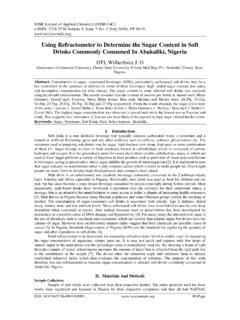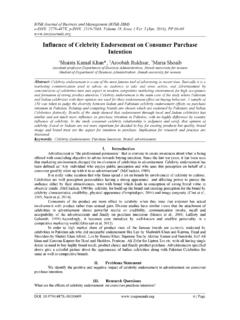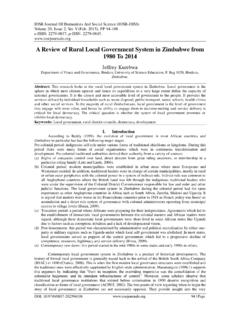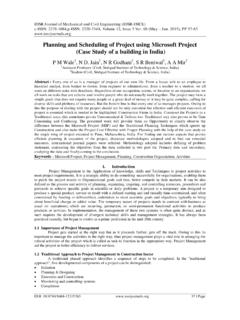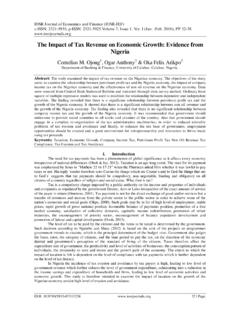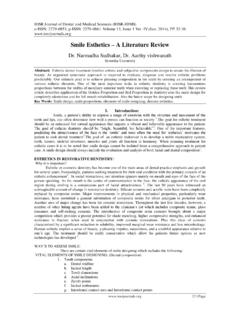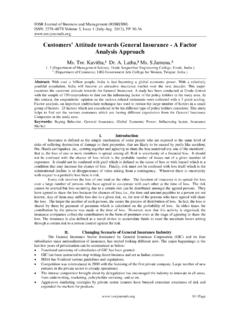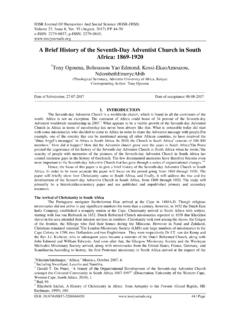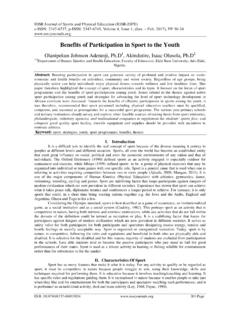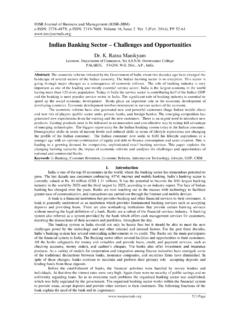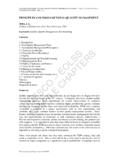Transcription of TOTAL QUALITY MANAGEMENT AND CORPORATE FAILURE
1 IOSR Journal of Business and MANAGEMENT (IOSR-JBM) e-ISSN: 2278-487X, p-ISSN: 2319-7668. Volume 16, Issue V (Sep. 2014), PP 25-33 25 | Page TOTAL QUALITY MANAGEMENT and CORPORATE FAILURE in Nigeria Idam, Linus Egwu, Phd, Fnim Adjunct Senior Lecturer Faculty Of MANAGEMENT Sciences, Ebonyi State University, Abakaliki, Nigeria Abstract: The problem of CORPORATE FAILURE has continued to be of serious concern to academicians and practitioners, the world over. Of all the identified causal factors , MANAGEMENT related factors are generally considered predominant.
2 The search for MANAGEMENT system that can effectively address the problem of CORPORATE FAILURE has led to the current interest of researchers and practitioners in TOTAL QUALITY MANAGEMENT (TQM). Research findings on the relationship between TQM and CORPORATE performance have remained controversial across national boundaries and inconclusive in Nigeria. This paper investigated the relationship between identified critical success factors (CSFs) of TQM and elements of CORPORATE performance in Nigeria, using Pearson product moment correlation technique in a 6-3 factorial design.
3 The results of the factorial analysis showed positive and significantly high inter and intra-factorial correlation coefficient (r) among the CSFs of TQM and elements of CORPORATE performance at p < The hypotheses were tested by t-transformation of the correlation coefficient ( r). The results showed that implementation of the critical success factors of TQM will lead to enhanced return on investment, increase in asset base and greater market share of business organizations, and thus avert CORPORATE FAILURE in Nigeria. Key words: TOTAL QUALITY MANAGEMENT ; CORPORATE FAILURE .
4 I. Introduction The problem of CORPORATE FAILURE the world over has continued to be of serious concern to researchers, academicians, managers and operators both in the private and public sectors (Igwe, 1996; McRobert & Hoffman, 1997). McRobert and Hoffman (1997) define CORPORATE FAILURE as inability of a CORPORATE body to achieve a viable and sustainable economic mandate expressed in terms of minimum return required to keep the enterprise as a going concern, without a requirement for continual injections of additional funding.
5 A firm is said to have failed if it is insolvent (Heffernan, 1996; McRobert & Hoffman, 1997). A firm is insolvent when it has negative net assets; that is, its liabilities are in excess of the current value of its assets (Horne, 1980; Heffernan, 1996). CORPORATE FAILURE , particularly of key industries, precipitates a far-reaching multiplier effect, which negatively affects not only the stakeholders (shareholders, staff, suppliers, creditors etc.), but also the general economic health of the nation. In the international scene, the FAILURE of such international organizations as Bank of Credit and Commerce International (BCCI) (1991), the Barrings of UK (1995) and the Canadian Commercial Bank (1985) had threatened the global economy (Heffernan, 1996) In Nigeria, there have been serious cases of CORPORATE failures.
6 The banking sector alone recorded thirty-three cases between 1995 and 2000 (Central Bank of Nigeria, 2001). The manufacturing industry has witnessed cases of constant close down for reasons ranging from gross under capacity utilization to MANAGEMENT ineptitude. Nine financial institutions were in recent past declared failed by the Central Bank of Nigeria, resulting partly from inadequate capitalization and MANAGEMENT related shortcomings. Of all the causal factors in CORPORATE FAILURE identified by researchers and MANAGEMENT consultants, which include, among others, MANAGEMENT ineptitude, poor capitalization, staff related problems, environmental factors , macro socio-economic and political variables and technology, MANAGEMENT related factors are considered predominant (McRobert & Hoffman, 1997; Central Bank of Nigeria, 2001).
7 Bibleault (1992) in his study came up with the assertion that 52% of CORPORATE failures were caused by internally generated problems within MANAGEMENT control. In the last ten decades, a number of MANAGEMENT systems have evolved in a bid to solve organizational problems. These include the Scientific MANAGEMENT of Frederick W. Taylor, the Administrative MANAGEMENT theory of Henri Fayol, the Human Relations School, pioneered by Elton Mayo and his associates at the Hawthorne experiments, the Behavioural Science theories, the Systems/Contingency theories and MANAGEMENT by Objectives, amongst others (Hicks & Gullett, 1981).
8 Each of the MANAGEMENT systems has its merits and weaknesses and researchers have produced bewildering arrays of viewpoints and conclusions on their efficacy or otherwise in solving organizational problems. The search for a MANAGEMENT system that can effectively address the problem of CORPORATE FAILURE has led to the current interest of researchers and practitioners in TOTAL QUALITY MANAGEMENT (TQM), one of the latest TOTAL QUALITY MANAGEMENT and CORPORATE FAILURE In Nigeria 26 | Page MANAGEMENT philosophies rooted in integrative and collaborative efforts of organizational resources to continuously improve customer-focused services.
9 The basic question now facing researchers is: Is TQM a panacea for persistent CORPORATE failures, or is it merely adding to the list of MANAGEMENT theories, and thus deepening what Koontz and O Donnell (1976) described as MANAGEMENT theory jungle ? This paper attempts to investigate the relationship between TQM and CORPORATE performance in Nigeria. II. Literature Review i. The Concept of TOTAL QUALITY MANAGEMENT (TQM) Varying views and shades of opinion have been expressed by academicians and practitioners over the concept and definition of TQM.
10 Bounds, Yorks, Adams & Ranney (1994) adduce three reasons for this disagreement. The first is that TQM is an evolving concept, which changes as new ideas and methods are developed. The second reason is that different organizations are at different stages of transforming to TQM; and thirdly, different organizations may require different forms of TQM. Bounds et al. (1994) assert that TQM is not just another programme, nor is it just a managerial style or motivational gimmick for adoption by organizations. They rather see TQM, in the light of a paradigm shift, as a cultural transformation that is driven by the redefinition of roles and focus of organizational members.
